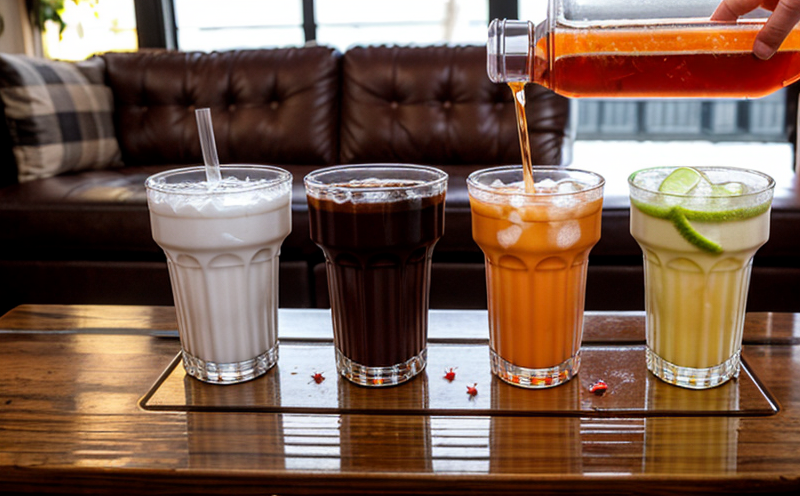ISO 11133 Microbiological Testing of Beverages
The ISO 11133 standard provides a robust framework for microbiological testing in beverages. This service ensures that the microorganisms present in beverages are identified, quantified, and controlled to meet quality assurance standards.
Microbiological contamination can pose significant risks to public health, particularly if harmful pathogens like Salmonella or Listeria are present. ISO 11133 is widely recognized for its comprehensive approach, which includes sampling strategies, sample preparation methods, culture media selection, and the use of appropriate detection systems.
Our laboratory adheres strictly to this standard, ensuring that all testing procedures are conducted in a controlled environment. This allows us to provide accurate results that are both reliable and consistent with international standards.
The testing process involves several key steps:
- Sampling: Proper sampling is crucial for obtaining representative samples from the beverage. We use standardized protocols to ensure that all samples are collected under controlled conditions, minimizing contamination risks.
- Sample Preparation: Prepared samples undergo initial processing, which may include homogenization or dilution, depending on the beverage type and expected microbial load.
- Incubation: Samples are incubated in culture media that supports the growth of various microorganisms. This step is critical for identifying specific pathogens that may be present.
- Identification: Once microorganisms have grown, they are identified using advanced techniques such as biochemical tests or molecular diagnostics like PCR.
- Data Analysis and Reporting: Results are analyzed according to ISO 11133 guidelines, providing clear reports that outline the presence, quantity, and types of microorganisms found in the beverage.
Our laboratory uses state-of-the-art equipment, including PCR machines and automated culture systems, to ensure precise and accurate testing results. We also employ highly trained microbiologists who are proficient in interpreting complex data sets generated during the testing process.
Besides adhering strictly to ISO 11133 standards, our laboratory continuously updates its methodologies based on new scientific findings and technological advancements. This ensures that we remain at the forefront of microbiological testing practices, providing clients with up-to-date insights into beverage safety and quality.
International Acceptance and Recognition
The ISO 11133 standard for microbiological testing has gained widespread acceptance across various industries due to its stringent requirements and consistent results. It is widely recognized by regulatory authorities, quality assurance professionals, and industry leaders.
In the food & feed sector, compliance with ISO 11133 standards enhances a company's reputation as a leader in product safety and quality control. This recognition extends beyond national borders, making it easier for companies to export their products internationally.
Our laboratory is fully accredited under ISO/IEC 17025:2017, ensuring that all our testing services meet the highest quality assurance standards. Our accreditations and certifications are recognized globally, providing clients with confidence in the reliability of our results.
Competitive Advantage and Market Impact
- Informed Decision-Making: By adhering to ISO 11133 standards, companies can make informed decisions regarding their product development processes. This leads to improved product safety and reduced risk of recalls or lawsuits.
- Enhanced Reputation: Compliance with international standards enhances a company's reputation among consumers, investors, and regulatory bodies. This can result in increased market share and customer loyalty.
- Regulatory Compliance: Many countries require adherence to international standards for food safety. ISO 11133 ensures that companies meet these requirements, avoiding potential legal issues or financial penalties.
- Innovation Support: By using the latest testing methodologies and equipment, our laboratory supports innovation in product development. This allows clients to stay ahead of competitors by offering safer, higher-quality products.
Our commitment to ISO 11133 standards not only benefits individual companies but also contributes to a healthier global food supply chain. By ensuring that all beverages meet the highest safety and quality standards, we help protect public health worldwide.
Use Cases and Application Examples
| Application Example | Description |
|---|---|
| Bottled Water Testing | We conduct comprehensive microbiological testing on bottled water to ensure that it meets strict quality standards. This includes checking for the presence of coliform bacteria and other potential contaminants. |
| Soft Drink Inspection | Our laboratory performs rigorous testing on soft drinks to identify any possible microbial contamination, especially in relation to mold or yeast growth. |
| Juice Quality Assurance | We ensure that juices are free from harmful microorganisms by conducting thorough microbiological analysis. This helps maintain brand reputation and consumer trust. |
| Alcoholic Beverage Analysis | Alcoholic beverages require specialized testing due to their unique characteristics. We use advanced techniques to analyze these products for microbial content, ensuring they are safe for consumption. |
| Beverage Export Compliance | For companies exporting beverages internationally, we provide ISO 11133-compliant test results to meet the stringent requirements of importing countries. |
The above examples highlight how our laboratory's expertise in ISO 11133 microbiological testing can be applied across different beverage types. By ensuring that all beverages comply with international standards, we contribute to a safer and more reliable global food supply chain.





